
Egyptian media are having a field day ripping into ousted president Hosni Mubarak, his family and cronies, with state-run news organizations doing an about-face from traditional kowtowing to authority.
Coverage has ranged from serious to ludicrous, and, given Egyptians' noted sense of humor, downright hilarious.
Yosri Fouda, a former investigative journalist with Qatar's Aljazeera and host of a show on Egypt's On TV, aired a picture of Mubarak wearing a pinstripe suit with his name sewn into the stripes.
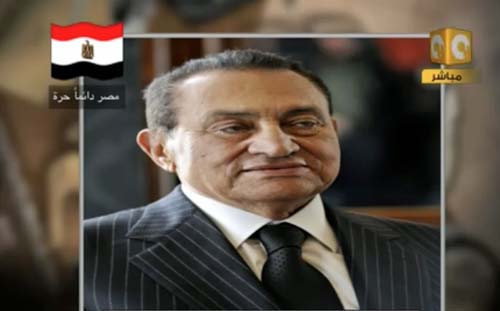
Hosni Mubarak's suit (Abu-Fadil)
Fouda, whose show is entitled "Akher Kalam" (The Last Word) brought an expert into the studio to analyze Mubarak's state of mind.
The camera zeroed in on the garment to show vertical letters.
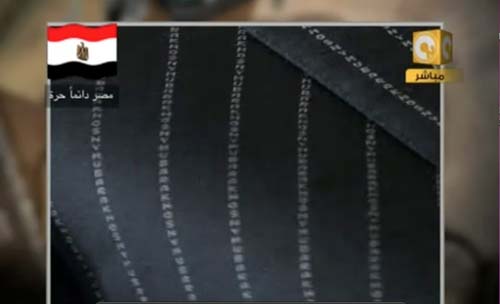
Hosni Mubarak's suit with his name woven into the pinstripes (Abu-Fadil)
"The stripes in the suit have the name Hosni Mubarak woven in English and repeated throughout," Fouda said, adding that he had noticed it when the photo was enlarged.
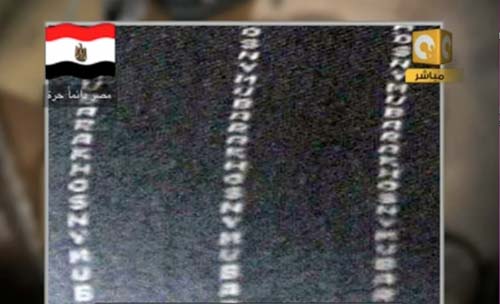
The demonstration would have been unthinkable when Mubarak was in power.
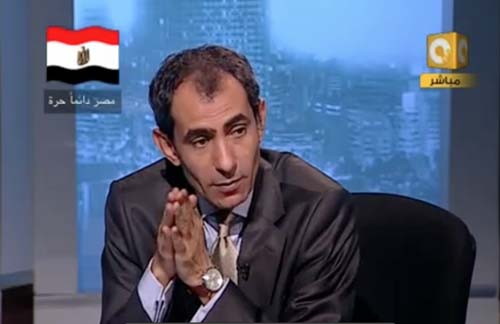
Yosri Fouda discusses Mubarak's pinstripe suit (Abu-Fadil)
Asked for his opinion, the guest said Mubarak's expression and the suit he wore reflected an attitude of dismissiveness, superiority and narcissism.
"A person who writes his name on his suit indicates self-importance, and that only comes when he feels he's got absolute power and represents Egypt -- there's no Egypt, I'm Egypt," the expert said.
It also signified that person had been in power too long and was one with his chair, the expert explained.
Interestingly, On TV is privately owned by Egyptian billionaire Naguib Sawiris, who benefited under the Mubarak regime and whose businesses have cashed in on deals in North Korea.
When the Egyptian revolution first broke out, the opposition paper Al Wafd reported a number of rich Egyptians had prepared their private jets for a hasty exit and that Sawiris had fled to Dubai, but he denied it and subsequently made several media appearances from Cairo.
Sawiris told an interviewer defensively last month: "Not all businessmen are crooks."
Meanwhile, state-run newspapers like Al Ahram have also jumped on the bandwagon of dissecting the Mubarak regime's misdeeds.
This week's youth supplement published an article entitled "Al Fasad Fi Hemayat El Hanem," (corruption under her ladyship's protection), in reference to former first lady Suzanne Mubarak (née Thabet) who was known derisively as Marie Antoinette or Lady Macbeth.
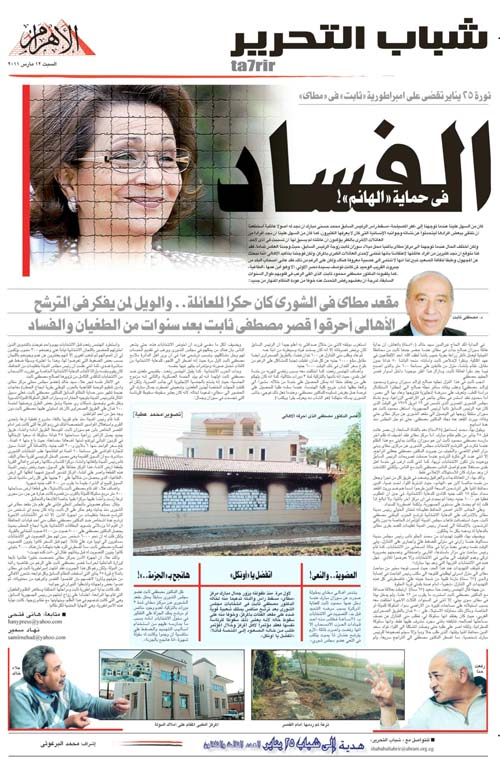
Suzanne Mubarak's family corruption uncovered by Al Ahram
The piece said Egypt's January 25 revolution had terminated the empire of her first cousin and Consultative Council member Mustafa Thabet from the Upper Egypt Menia district town of Matay, where demonstrators had apparently set his fancy villa on fire.
The townspeople considered Thabet a tyrant who had terrorized them for years to the point they feared retribution and a return of the old regime if they spoke ill of him, the paper said.
Thabet's council seat had been a family monopoly -- his father had held it before him -- and trouble began in Matay when Bahaa Mohamad Ismail of Egypt's Channel 7 considered running for the same seat last year.
At first Ismail hesitated, given Thabet's bad reputation, but the former decided to forge ahead, only to begin encountering obstacles such as being forced to pay 1,800 Egyptian Pounds ($330) promotional insurance to the district when the real fee was 1,000 Pounds ($181) -- a burden in a relatively poor region.
Further pressures and threats against Ismail and his family, as well as harassment of other candidates "who dared run against 'the lady's cousin', convinced him to withdraw from the race," the report said.
The Consultative Council was for years the fiefdom of Mubarak loyalist Safwat Al Sherif, who headed the body that rubber-stamped executive decisions.

Safwat Al Sherif (Abu-Fadil)
The octogenarian Al Sherif had served as information minister under Mubarak and was a holdover from the days of predecessors Anwar Sadat and Gamal Abdel Nasser.
The new head of the (discredited and former ruling) National Democratic Party ousted former information minister Anas Al Fiqi (another Mubarak partisan), and accepted Al Sharif's resignation from the ranks, according to Al Ahram.
The paper's post-revolution coverage has been a far cry from its historical role as chief cheerleader for the regime and the ruling party.
In January Al Ahram's journalists issued a statement calling for the resignation or removal of Mubarak from power and disavowed their executives' decisions to besmirch the demonstrators and write falsehoods about the revolt.
So beholden to the regime were the publisher and top editors that in October 2010, the paper photoshopped a picture of Mubarak to show him walking ahead of President Barack Obama at the White House.
The recent turnaround prompted blogger Zeinobia to ask "Is this Al Ahram? Official Paper Gets Teeth."
"I still find it hard to associate the front page of Al Ahram with headlines like this," she said of a story about the Mubarak family's multi-million dollar secret accounts in Egyptian banks. "I think many Egyptians agree with me: it is hard to believe that this is the Al Ahram official newspaper."
Additional proof of the change: The paper published a cartoon about press freedom and the January 25 revolution with two pens with wings flying out of a birdcage.
And, a proverbial nail in the coffin of the paper's CEO, Abdel Moneim Said, was a decision to cancel "Behind the Events," a show he hosted on official TV.
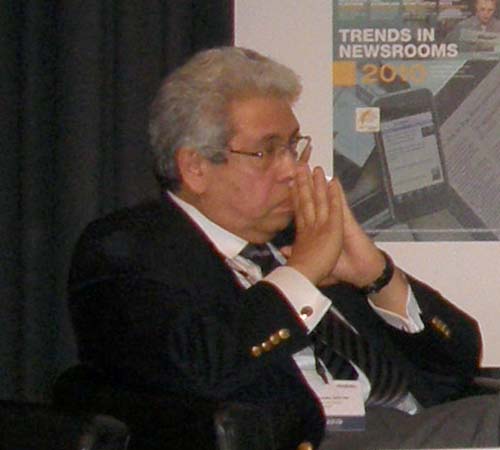
Abdel Moneim Said (Abu-Fadil)
Earlier this month Said admitted that the paper had "misread the revolution" and that the January 25 headline about a revolution in Lebanon (rather than the one in his backyard) had been a mistake.
